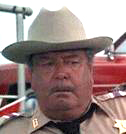Satellites Will Be Used to Catch You Speeding
Big Brother will be watching your movements from space.

Bad news for those with lead feet: Britain is testing a new type of speed camera that can track your average speed over long distances while mounted on satellites in space. Similar to radar guns used here on Earth, the cameras will combine plate reading technology with GPS, and will be able to cover a network of streets rather than just a straight line of detection.
According to The Telegraph, the new technology--called the SpeedSpike system--is undergoing tests at two sites, one in Southwark, London, and the other somewhere between Antony and Torpoint in Cornwall. Developed by PIPS Technology Ltd., the system works by calculating the average speed between any two points in the network, and then applies that average against the vehicle moving through the same two points.
The company claims that the new technology can capture plates in all weather conditions, 24 hours a day. There was also mention that the system carries a low cost, and is easy to install. Its main use would be for enforcing speeds on heavily congested roadways, and to cut down on the number of speeders zooming through school zones. It would also eliminate the need for physical speed traps, allowing departments to assign officers to other duties.
So is this new system working? "The Home Office said it was unable to comment on the trials because of 'commercial confidentiality,'" the Telegraph reported.
Get instant access to breaking news, the hottest reviews, great deals and helpful tips.
Kevin started taking PCs apart in the 90s when Quake was on the way and his PC lacked the required components. Since then, he’s loved all things PC-related and cool gadgets ranging from the New Nintendo 3DS to Android tablets. He is currently a contributor at Digital Trends, writing about everything from computers to how-to content on Windows and Macs to reviews of the latest laptops from HP, Dell, Lenovo, and more.
-
darkknight22 ReplyThere was also mention that the system carries a low cost, and is easy to install.
How in the hell are effing SATELLITES IN SPACE low cost and easy to install? WTF are you comparing this to? -
mp562 All kinds of weather conditions huh? I highly doubt it's going to be able to see through the clouds, just like how your satellite tv goes out when it's raining.Reply -
speedemon more control/fear... at the very least this would free up police officers to take care of more important mattersReply -
jsponaugle you have the right to face your accuser. Id like to see this satellite appear in court.Reply -
LoneEagle The fine will go to the owner.Reply
So, just borrow your friend's car or someone you don't like! :) -
matt87_50 I can't believe the British let their government waste so much of their tax dollars on useless nanny state stuff. no wonder the union is broke!Reply
